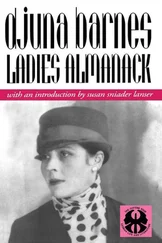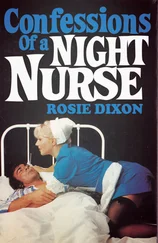‘Ah!’ he said. ‘Love, that terrible thing!’
She began to beat the cushions with her doubled fist. ‘What could you know about it? Men never know anything about it, why should they? But a woman should know—they are finer, more sacred; my love is sacred and my love is great!’
‘Shut up,’ Robin said, putting her hand on her knee. ‘Shut up, you don’t know what you are talking about. You talk all the time and you never know anything. It’s such an awful weakness with you. Identifying yourself with God!’ She was smiling, and the English girl, breathing very quickly, lit a cigarette. The child remained speechless, as she had been for the duration of the drive, her head turned as if fixed, looking at Robin, and trying to hold her slight legs, that did not reach the floor, from shaking with the shaking of the carriage.
Then Jenny struck Robin, scratching and tearing in hysteria, striking, clutching and crying. Slowly the blood began to run down Robin’s cheeks, and as Jenny struck repeatedly Robin began to go forward as if brought to the movement by the very blows themselves, as if she had no will, sinking down in the small carriage, her knees on the floor, her head forward as her arm moved upward in a gesture of defence; and as she sank, Jenny also, as if compelled to conclude the movement of the first blow, almost as something seen in retarded action, leaned forward and over, so that when the whole of the gesture was completed, Robin’s hands were covered by Jenny’s slight and bending breast, caught in between the bosom and the knees. And suddenly the child flung herself down on the seat, face outward, and said in a voice not suitable for a child, because it was controlled with terror: ‘Let me go! Let me go! Let me go!’
The carriage at this moment drew smartly up into the rue du Cherche-Midi. Robin jumped before the carriage stopped, but Jenny was close behind her, following her as far as the garden.
It was not long after this that Nora and Robin separated; a little later Jenny and Robin sailed for America.
CHAPTER FIVE
Watchman, what of the Night?
About three in the morning, Nora knocked at the little glass door of the concierge’s loge , asking if the doctor was in. In the anger of broken sleep the concierge directed her to climb six flights, where at the top of the house, to the left, she would find him.
Nora took the stairs slowly. She had not known that the doctor was so poor. Groping her way she rapped, fumbling for the knob. Misery alone would have brought her, though she knew the late hours indulged in by her friend. Hearing his ‘come in’ she opened the door and for one second hesitated, so incredible was the disorder that met her eyes. The room was so small that it was just possible to walk sideways up to the bed, it was as if being condemned to the grave the doctor had decided to occupy it with the utmost abandon.
A pile of medical books, and volumes of a miscellaneous order, reached almost to the ceiling, water-stained and covered with dust. Just above them was a very small barred window, the only ventilation. On a maple dresser, certainly not of European make, lay a rusty pair of forceps, a broken scalpel, half a dozen odd instruments that she could not place, a catheter, some twenty perfume bottles, almost empty, pomades, creams, rouges, powder boxes and puffs. From the half-open drawers of this chiffonier hung laces, ribands, stockings, ladies’ underclothing and an abdominal brace, which gave the impression that the feminine finery had suffered venery. A swill-pail stood at the head of the bed, brimming with abominations. There was something appallingly degraded about the room, like the rooms in brothels, which give even the most innocent a sensation of having been accomplice; yet this room was also muscular, a cross between a chambre à coucher and a boxer’s training camp. There is a certain belligerence in a room in which a woman has never set foot; every object seems to be battling its own compression—and there is a metallic odour, as of beaten iron in a smithy.
In the narrow iron bed, with its heavy and dirty linen sheets, lay the doctor in a woman’s flannel night gown.
The doctor’s head, with its over-large black eyes, its full gun-metal cheeks and chin, was framed in the golden semi-circle of a wig with long pendent curls that touched his shoulders, and falling back against the pillow, turned up the shadowy interior of their cylinders. He was heavily rouged and his lashes painted. It flashed into Nora’s head: ‘God, children know something they can’t tell, they like Red Riding Hood and the wolf in bed!’ But this thought, which was only the sensation of a thought, was of but a second’s duration, as she opened the door; in the next, the doctor had snatched the wig from his head, and sinking down in the bed drew the sheets up over his breast. Nora said, as quickly as she could recover herself: ‘ Doctor, I have come to ask you to tell me everything you know about the night.’ As she spoke, she wondered why she was so dismayed to have come upon the doctor at the hour when he had evacuated custom and gone back into his dress. The doctor said, ‘You see that you can ask me anything,’ thus laying aside both their embarrassments. She said to herself: ‘Is not the gown the natural raiment of extremity? What nation, what religion, what ghost, what dream has not worn it—infants, angels, priests, the dead; why—should not the doctor, in the grave dilemma of his alchemy, wear his dress?’ She thought: ‘He dresses to lie beside himself, who is so constructed that love, for him, can be only something special; in a room that giving back evidence of his occupancy, is as mauled as the last agony.’
‘Have you ever thought of the night?’ the doctor inquired with a little irony; he was extremely put out, having expected someone else, though his favourite topic, and one which he talked on whenever he had a chance, was the night. ‘Yes,’ said Nora, and sat down on the only chair. ‘I’ve thought of it, but thinking about something you know nothing about does not help.’
‘Have you’, said the doctor, ‘ever thought of the peculiar polarity of times and times; and of sleep? Sleep the slain white bull? Well, I, doctor Matthew-Mighty-grain-of-salt-Dante-O’Connor, will tell you how the day and the night are related by their division. The very constitution of twilight is a fabulous reconstruction of fear, fear bottom-out and wrong side up. Every day is thought upon and calculated, but the night is not premeditated. The Bible lies the one way, but the night gown the other. The Night, “Beware of that dark door!"’
‘I used to think’, Nora said, ‘that people just went to sleep, or if they did not go to sleep, that they were themselves, but now,’ she lit a cigarette and her hands trembled, ‘now I see that the night does something to a person’s identity, even when asleep.’ ’
‘Ah!’ exclaimed the doctor. ‘Let a man lay himself down in the Great Bed and his “identity” is no longer his own, his “trust” is not with him, and his “willingness” is turned over and is of another permission. His distress is wild and anonymous. He sleeps in a Town of Darkness, member of a secret brotherhood. He neither knows himself nor his outriders, he berserks a fearful dimension and dismounts, miraculously, in bed!
‘His heart is tumbling in his chest, a dark place! Though some go into the night as a spoon breaks easy water, others go head foremost against a new connivance; their horns make a dry crying, like the wings of the locust, late come to their shedding.
‘Have you thought of the night, now, in other times, in foreign countries—in Paris? When the streets were gall high with things you wouldn’t have done for a dare’s sake, and the way it was then; with the pheasants’ necks and the goslings’ beaks dangling against the hocks of the gallants, and not a pavement in the place, and everything gutters for miles and miles, and a stench to it that plucked you by the nostrils and you were twenty leagues out! The criers telling the price of wine to such good effect that the dawn saw good clerks full of piss and vinegar, and blood-letting in side streets where some wild princess in a night shift of velvet howled under a leech; not to mention the palaces of Nymphenburg echoing back to Vienna with the night trip of late kings letting water into plush cans and fine woodwork, no,’ he said looking at her sharply, ‘I can see you have not! You should, for the night has been going on for a long time.’
Читать дальше












